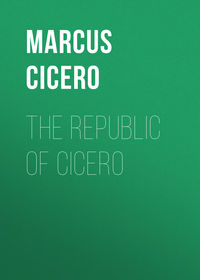 полная версия
полная версияDe Amicitia, Scipio's Dream
FANNIUS. But we would rather have it from you. Although I have often consulted those philosophers also, and have listened to them not unwillingly, yet the thread of your discourse differs somewhat from that of theirs.
SCAEVOLA. You would say so all the more, Fannius, had you been present in Scipio's garden at that discussion about the republic, and heard what an advocate of justice he showed himself in answer to the elaborate speech of Philus. [Footnote: Carneades, when on an embassy to Rome, for the entertainment of his Roman hosts, on one day delivered a discourse in behalf of justice as the true policy for the State, and on the next day delivered an equally subtile and eloquent discourse maintaining the opposite thesis. In the third Book of the De Republica Philus is made the "devil's advocate," and has assigned to him the championship of what we are wont to call a Machiavelian policy, and, in general, of the morally wrong as the politically right. He is represented astaking the part reluctantly, saying that one consents to soil his hands in order to find gold, and he professes to give the substance of the famous discourse of Carneades. Laelius answers him, and, so far as we can judge from the fragments of his reply that are extant, with the preponderance of reason, which Cicero intended should incline on the better side. There was perhaps a sublatent irony in making Philus play this part; for he was an eminently upright man. Valerius Maximus eulogizes him for his rigid integrity and impartiality, and relates that when at the expiration of his consulship he was sent to take command of the army against Numantia, he chose for his lieutenants Metellus and Pompeius, both his intensely bitter enemies, but the men best fitted for the service.]
FANNIUS. It was indeed easy for the man pre-eminently just to defend justice.
SCAEVOLA. As to friendship, then, is not its defence easy for him who has won the highest celebrity on the ground of friendship maintained with pre-eminent faithfulness, consistency, and probity?
8. LAELIUS. This is, indeed, the employing of force; for what matters the way in which you compel me? You at any rate do compel me; for it is both hard and unfair not to comply with the wishes of one's sons-in-law, especially in a case that merits favorable consideration.
In reflecting, then, very frequently on friendship, the foremost question that is wont to present itself is, whether friendship is craved on account of conscious infirmity and need, so that in bestowing and receiving the kind offices that belong to it each may have that done for him by the other which he is least able to do for himself, reciprocating services in like manner; or whether, though this relation of mutual benefit is the property, of friendship it has yet another cause; more sacred and more noble, and derived more genuinely from the very nature of man. Love, which in our language gives name to friendship, [Footnote: Amor,—amicitia.] bears a chief part in unions of mutual benefit; for a revenue of service is levied even on those who are cherished in pretended friendship, and are treated with regard from interested motives. But in friendship there is nothing feigned, nothing pretended, and whatever there is in it is both genuine and spontaneous. Friendship, therefore, springs from nature rather than from need,—from an inclination of the mind with a certain consciousness of love rather than from calculation of the benefit to be derived from it. Its real quality may be discerned even in some classes of animals, which up to a certain time so love their offspring, and are so loved by them, that the mutual feeling is plainly seen,—a feeling which is much more clearly manifest in man, first, in the affection which exists between children and parents, and which can be dissolved only by atrocious guilt; and in the next place, in the springing up of a like feeling of love, when we find some one of manners and character congenial with our own, who becomes dear to us because we seem to see in him an illustrious example of probity and virtue For there is nothing more lovable than virtue,—nothing which more surely wins affectionate regard, insomuch that on the score of virtue and probity we love even those whom we have never seen. Who is there that does not recall the memory of Caius Fabricius, of Manius Curius, of Tiberius Coruncanras, whom he never saw, with some good measure of kindly feeling? On the other hand, who is there that can fail to hate Tarquinius Superbus, Spurius Cassius, Spurius Maelius? Our dominion in Italy was at stake in wars under two commanders, Pyrrhus and Hannibal. On account of the good faith of the one, we hold him in no unfriendly remembrance; [Footnote: Pyrrhus, after the only victory that he obtained over the Romans, treated his prisoners with signal humanity, and restored them without ransom. See De Officiis, i. 12] the other because of his cruelty our people must always hate. [Footnote: It may be doubted wheter Hannibal deserved the reproach here implied. The Roman historians ascribe to him acts of cruelty no worse than their own generals were chargeable with: while nothing of the kind is related by either Polybius, or Plutarch. It is certain that after the battle of Cannae he checked the needless slaughter of the Roman fugitives, and Livy relates several instances in which he paid funeral honors, to distinguished Romans slain in battle. The intense hostility of the Romans to Carthage may have led to an unfair estimate of the great general's character, and to the invention or exaggeration of reports to his discredit.]
9. But if good faith has such attractive power that we love it in those whom we have never seen, or—what means still more—in an enemy, what wonder is it if the minds of men are moved to affection when they behold the virtue and goodness of those with whom they can become intimately united?
Love is, indeed, strengthened by favors received, by witnessing assiduity in one's service, and by habitual intercourse; and when these are added to the first impulse of the mind toward love, there flames forth a marvellously rich glow of affectionate feeling. If there are any who think that this proceeds from conscious weakness and the desire to have some person through whom one can obtain what he lacks, they assign, indeed, to friendship a mean and utterly ignoble origin, born, as they would have it, of poverty and neediness. If this were true, then the less of resource one was conscious of having in himself, the better fitted would he be for friendship. The contrary is the case; for the more confidence a man has in himself, and the more thoroughly he is fortified by virtue and wisdom, so that he is in need of no one, and regards all that concerns him as in his own keeping, the more noteworthy is he for the friendships which he seeks and cherishes. What? Did Africanus need me? Not in the least by Hercules. As little did I need him. But I was drawn to him by admiration of his virtue while he, in turn, loved me, perhaps from some favorable estimate of my character, and intimacy incieased our mutual affection. But though utilities many and great resulted from our friendship, the cause of our mutual love did not proceed from the hope of what it might bring. For as we are beneficent and generous, not in order to exact kindnesses in return (for we do not put our kind offices to interest), but are by nature inclined to be generous, so, in my opinion, friendship is not to be sought for its wages, but because its revenue consists entirely in the love which it implies. Those, however, who, after the manner of beasts, refer everything to pleasure, [Footnote: The Epicureans] think very differently. Nor is it wonderful that they do, for men who have degraded all their thoughts to so mean and contemptible an end can rise to the contemplation of nothing lofty, nothing magnificent and divine. We may, therefore, leave them out of this discussion. But let us have it well understood that the feeling of love and the endearments of mutual affection spring from nature, in case there is a well-established assurance of moral worth in the person thus loved. Those who desire to become friends approach each other, and enter into relation with each other, that each may enjoy the society and the character of him whom he has begun to love, and they are equal in love, and on either side are more inclined to bestow obligations than to claim a return, so that in this matter there is an honorable rivalry between them. Thus will the greatest benefits be derived from friendship, and it will have a more solid and genuine foundation as tracing its origin to nature than if it proceeded from human weakness. For if it were utility that cemented friendships, an altered aspect of utility would dissolve them. But because nature cannot be changed, therefore true friendships are eternal. This may suffice for the origin of friendship, unless you have, perchance, some objection to what I have said.
FANNIUS. Go on, Laelius. I answer by the right of seniority for Scaevola who is younger than I am.
SCAEVOLA. I am of the same mind with you. Let us then, hear farther.
10 LAELIUS. Hear then, my excellent friends the substance of the frequent discussions on friendship between Scipio and me. He indeed, said [footnote: The construction of this entire section is in the subjective imperfect depending on the dicebat in the second sentence. It has seemed to me that the direct form of constiution which I have adopted is more consonant with the genius of our language.] that nothing is more difficult than for friendship to last through life; for friends happen to have conflicting interests, or different political opinions. Then, again, as he often said, characters change, sometimes under adverse conditions, sometimes with growing years. He cited also the analogy of what takes place in early youth, the most ardent loves of boyhood being often laid aside with its robe. But if friendships last on into opening manhood, they are not infrequently broken up by rivalry in quest of a wife, or in the pursuit of some advantage which only one can obtain. [Footnote: Had Cicero not been personating Laelius, who died long before the quarrel occurred, he would undoubtedly have cited the case of Servilius Caepio and Livius Diusus. They married each other's sisters, and were united in the closest intimacy, and seemingly in the dearest mutual love; but as rivals in bidding for a ring at an auction-sale they had their first quarrel, which grew into intense mutual hatred, led almost to a civil war between their respective partisans, and bore no small part in starting the series of dissentions which issued in the Social War, and the destruction of not far from three hundred thousand lives. I refer to this in a note, because it must have been fresh in Cicero's memory, and had annotation been the habit of his time, he would most assuredly have given it the place which I now give it.] Then, if friendships are of longer duration, they yet, as Scipio said, are liable to be undermined by competition for office; and indeed there is nothing more fatal to friendship than, in very many cases, the greed of gain, and among some of the best of men the contest for place and fame, which has often engendered the most intense enmity between those who had been the closest friends. Strong and generally just aversion, also, springs up when anything morally wrong is required of a friend; as when he is asked to aid in the gratification of impure desire, or to render his assistance in some unrighteous act,—in which case those who refuse, although their conduct is highly honorable, are yet charged by the persons whom they will not serve with being false to the claims of friendship, while those who dare to make such a demand of a friend profess, by the very demand, that they are ready to do anything and everything for a friend's sake. By such quarrels, not only are old intimacies often dissolved, but undying hatreds generated. So many of these perils hang like so many fates over friendship, that to escape them all seemed to Scipio, as he said, to indicate not wisdom alone, but equally a rare felicity of fortune.
11. Let us then, first, if you please, consider how far the love of friends ought to go. If Coriolanus had friends, ought they to have helped him in fighting against his country, or should the friends of Viscellinus [Footnote: Spurius Cassius Viscellinus, the author of the earliest agrarian law, passed, but never carried into execution. He was condemned to death,—probably a victim to the rancorous opposition of the patrician order, of which he was regarded as a recreant member by virtue of his advocacy of the rights or just claims of the plebs. Cicero in early life was by no means so hostile to the principle underlying the agrarian laws, and to the memory of the Gracchi, as he was after he had reached the highest offices in the gift of the people.] or those of Spurius Maelius [Footnote: Maelius, of the equestrian order, but of a plebeian family, obtained unbounded popularity with the plebs by selling corn at a low price, and giving away large quantities of it, in a time of famine. He was charged with seeking kingly power, and, on account of his alleged movements with that purpose, Cincinnatus was appointed dictator, and Maelius, resisting a summons to his tribunal, was killed by Ahala, his master of the horse. There seems to have been little evidence of his actual guilt.] have aided them in the endeavor to usurp regal power? We saw, indeed, Tiberius Gracchus, when he was disturbing the peace of the State, deserted by Quintus Tubero and others with whom he had been on terms of intimacy. But Caius Blossius, of Cumae, the guest,[Footnote: Hospes, guest, host, or both.] Scaevola, of your family, coming to me, when I was in conference with the Consuls Laenas and Rupilius, to implore pardon, urged the plea that he held Tiberius Gracchus in so dear esteem that he felt bound to do whatever he desired. I then asked him, "Even if he had wanted you to set fire to the Capitol, would you have done it?" He replied, "He never would have made such a request." "But if he had?" said I. "I would have obeyed him," was the answer. And, by Hercules, he did as he said, or even more; for he did not so much yield obedience to the audacious schemes of Tiberius Gracchus, as he was foremost in them; he was not so much the companion of his madness, as its leader. Therefore, in consequence of this folly, alarmed by the appointment of special judges for his trial, he fled to Asia, entered the service of our enemies, and finally met the heavy and just punishment for his disloyalty to his country. [Footnote: He took refuge with Aristonicus, King of Pergamus, then at war with Rome; and when Aristonicus was conquered, Blossius committed suicide for fear of being captured by the Roman army.]
It is, then, no excuse for wrong-doing that you do wrong for the sake of a friend. Indeed, since it may have been a belief in your virtue that has made one your friend, it is hard for friendship to last if you fall away from virtue. But if we should determine either to concede to friends whatever they may ask, or to exact from them whatever we may desire, we and they must be endowed with perfect wisdom, in order for our friendship to be blameless. We are speaking, however, of such friends as we have before our eyes, or as we have seen or have known by report,—of such as are found in common life. It is from these that we must take our examples, especially from such of them as make the nearest approach to perfect wisdom. We have learned from our fathers that Papus Aemilius was very intimate with Caius Luscinus, they having twice been consuls together, as well as colleagues in the censorship; and it is said also that Manius Curius and Tiberius Coruncanius lived in the closest friendship both with them and with each other. Now we cannot suspect that either of these men would have asked of one of his friends anything inconsistent with good faith, or with an engagement sanctioned by oath, or with his duty to the State. Indeed, to what purpose is it to say that among such men if one had asked anything wrong, he would not have obtained it? For they were men of the most sacred integrity; while to ask anything wrong of a friend and to do it when asked are alike tokens of deep depravity. But Caius Carbo and Caius Cato were the followers of Tiberius Gracchus, as was his brother Caius, at first with little ardor, but now [Footnote: Now, that is, at the time at which this dialogue has its assumed date, immediately after Scipio's death. At that time Caius Gracchus was acting as a commissioner under his brother's agrarian law.] most zealously.
12. As to friendship, then, let this law be enacted, that we neither ask of a friend what is wrong, nor do what is wrong at a friend's request. The plea that it was for a friend's sake is a base apology,—one that should never be admitted with regard to other forms of guilt, and certainly not as to crimes against the State. We, indeed, Fannius and Scaevola, are so situated that we ought to look far in advance for the perils that our country may incur. Already has our public policy deviated somewhat from the method and course of our ancestors. Tiberius Gracchus attempted to exercise supreme power; nay, he really reigned for a few months. What like this had the Roman people ever heard or seen before? What, after his death, the friends and kindred who followed him did in their revenge on Publius Scipio [Footnote: Publius Cornelius Scipio Nasica, who took the lead of the Senate in the assassination of Tiberius Gracchus, and incurred such popular odium that he could not safely stay in Rome. He was sent on a fictitious mission to Asia to get him out of the way of the people, and not daring to return, wandered with no settled habitation till his death at Pergamum not long before the assumed date of this dialogue.] I cannot say without tears. We put up with Carbo [Footnote: Carbo succeeded Tiberius Gracchus on the commission for carrying the agrarian law into execution, and was shortly afterward chosen Tribune. He then proposed a law, permitting a tribune to be re-elected for an indefinite number of years. This law was vehemently opposed by Scipio Africanus the Younger, and if he was really killed by Carbo, it was probably on account of his hostility to Carbo's ambitious schemes.] as well as we could in consideration of the recent punishment of Tiberius Gracchus; but I am in no mood to predict what is to be expected from the tribuneship of Caius Gracchus. Meanwhile the evil is creeping upon us, from its very beginning fraught with threats of ruin. Before recent events, [Footnote: The reference undoubtedly here is to the Papirian law which had just been passed before the assumed date of this dialogue, having been proposed and carried through by (Caius Papirius) Carbo. By this law the use of the ballot was established in all matters of popular legislation.] you perceive how much degeneracy was indicated in the legalization of the ballot, first by Gabinian, [Footnote: By which magistrates were to be chosen by ballot.] then two years later by the Cassian law. [Footnote: By which the judges were to be chosen by ballot. With reference to the use of the ballot the parties in Rome were prototypes of like parties in England. The voice of the people was for the ballot, on the ground that it made suffrage free, as it could not be when employers or patrons could dictate to their dependents and make them suffer for failure to vote in favor of their own candidates or measures. The aristocratic party opposed the ballot as fatal to their controlling influence, which many sincere patriots, like Cicero, regarded as essential to the public safety, while patrician demagogues, intriguers, and office-seekers made it subservient to their own selfish or partisan interests.] I seem already to see the people utterly alienated from the Senate, and the most important affairs determined by the will of the multitude; for more persons will learn how these things are brought about than how they may be resisted. To what purpose am I saying this? Because no one makes such attempts without associates. It is therefore to be enjoined on good men that they must not think themselves so bound that they cannot renounce their friends when they are guilty of crimes against the State. But punishment must be inflicted on all who are implicated in such guilt,—on those who follow, no less than on those who lead. Who in Greece was more renowned than Themistocles? Who had greater influence than he had? When as commander in the Persian war he had freed Greece from bondage, and for envy of his fame was driven into exile, he did not bear as he ought the ill treatment of his ungrateful country. He did what Coriolanus had done with us twenty years before. Neither of these men found any helper against his country; [Footnote: No one of his own fellow-countrymen.] they therefore both committed suicide. [Footnote: If the story of Coriolanus be not a myth, as Niebuhr supposes it to be, his suicide forms no part of the story as Livy tells it. The suicide of Themistocles is related as a supposition, not as an established fact. If he died of poison, as was said, it may have been administered by a rival in the favor of Artaxerxes.] Association with depraved men for such an end is not, then, to be shielded by the plea of friendship, but rather to be avenged by punishment of the utmost severity, so that no one may ever think himself authorized to follow a friend to the extent of making war upon his country,—an extremity which, indeed, considering the course that our public affairs have begun to take, may, for aught I know, be reached at some future time. I speak thus because I feel no less concern for the fortunes of the State after my death than as to its present condition.
13. Let this, then, be enacted as the first law of friendship, that we demand of friends only what is right, and that we do for the sake of friends only what is right. [Footnote: This is a virtual repetition of the law of friendship announced at the beginning of the previous section, and Cicero probably so intended it. He states the rule, then demonstrates its validity, then repeats it in an almost identical form, implying what the mathematician expresses when he puts at the end of a demonstration Quod èrat demonstrandum.] This understood, let us not wait to be asked. Let there be constant assiduity and no loitering in a friend's service. Let us also dare to give advice freely; for in friendship the authority of friends who give good counsel may be of the greatest value. Let admonition be administered, too, not only in plain terms, but even with severity, if need be, and let heed be given to such admonition. On this subject some things that appear to me strange have, as I am told, been maintained by certain Greeks who are accounted as philosophers, and are so skilled in sophistry that there is nothing which they cannot seem to prove. Some of them hold that very intimate friendships are to be avoided; that there is no need that one feel solicitude for others; that it is enough and more than enough to take care of your own concerns, and annoying to be involved to any considerable extent in affairs not belonging to you; that the best way is to have the reins of friendship as loose as possible, so that you can tighten them or let them go at pleasure; for, according to them, ease is the chief essential to happy living, and this the mind cannot enjoy, if it bears, as it were, the pains of travail in behalf of a larger or smaller circle of friends. [Footnote: This passage seems to be a paraphrase of a passage in the Hippolytus of Euripides, in which the Nurse says: "It behooves mortals to form moderate friendships with one another, and not to the very marrow of the soul, and the affections of the mind should be held loosely, so that we may slacken or tighten them. That one soul should be in travail for two is a heavy burden." Euripides was regarded, and rightly, as no less a philosopher than a tragedian, and was not infrequently styled [Greek: sophos]. Cicero here veils his thorough conversance with Greek literature and philosophy, and assumes the part of Laelius, in whose time, though Greek was not omitted in the education of cultivated men, the study was comparatively new, and was not carried to any great extent.]
Others, [Footnote: The Epicureans.] I am told, with even much less of true human feeling, teach what I touched upon briefly a little while ago, that friendships are to be sought for defence and help, not on account of good-will and affection. The less of self-confidence and the less of strength one has, the more is he inclined to make friends. Thus it is that women [Footnote: Latin, mulierculae, a diminutive, meaning, however, not little women, but denoting the feebleness and dependence of women in comparison with men. It must be confessed, too, that the term is sometimes used, and perhaps here, semi-contemptuously; for the Roman man felt an overweening pride in mere manhood.] seek the support of friendship more than men do, the poor more than the rich, the unfortunate more than those who seem happy. Oh, pre-eminent wisdom! It is like taking the sun out of the world, to bereave human life of friendship, than which the immortal gods have given man nothing better, nothing more gladdening. What is the ease of which they speak? It is indeed pleasing in aspect, but on many occasions it is to be renounced; for it is not fitting, in order to avoid solicitude, either to refuse to undertake any right cause or act, or to drop it after it is undertaken. If we flee from care, we must flee from virtue, which of necessity with no little care spurns and abhors its opposites, as goodness spurns and abhors wickedness; temperance, excess; courage, cowardice. Thus you may see that honest men are excessively grieved by the dishonest, the brave by the pusillanimous, those who lead sober lives by the dissolute. It is indeed characteristic of a well-ordered mind to rejoice in what is good and to be grieved by the opposite. If then, pain of mind fall to the lot of a wise man as it must of necessity unless we imagine his mind divested of its humanity, why should we take friendship wholly out of life, lest we experience some little trouble on account of it? Yet more, if emotion be eliminated, what difference is there, I say not between a man and a brute, but between a man and a rock, or the trunk of a tree, or any inanimate object? Nor are those to be listened to, who regard virtue as something hard and iron-like. [Footnote: Here, undoubtedly, Cicero refers to the sterner type of Stoicism, which in his time was already obsolescent, and was yielding place to the milder, while no less rigid, ethics of which the De Officiis may be regarded as the manual.] As in many other matters, so in friendship, it is tender and flexible so that it expands, as it were, with a friend's well being, and shrinks when his peace is disturbed. Therefore the pain which must often be incurred on a friend's account is not of sufficient moment to banish friendship from human life, any more than the occasional care and trouble which the virtues bring should be a reason for renouncing them.









